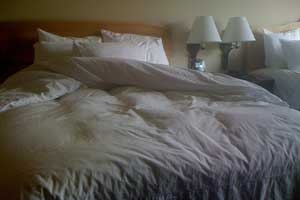5 Restful Ways to Fall Asleep Fast
Follow these simple steps to drift off quickly and easily
 "5 Restful Ways to Fall Asleep Fast" courtesy of peasap
"5 Restful Ways to Fall Asleep Fast" courtesy of peasap"What's the matter?!"
Gentle sobbing had brought me into my then-seven-year-old son Jake's bedroom.
"I can't go to sleep!" He sniffed. "I've got a spelling test in the morning; if I don't get to sleep soon, I won't do well!"
Major problem, this: Not spelling tests (well, they can be); no, the fact that the more you try to sleep, the more you drive it away. We're always told to try our best to overcome life's problems but sometimes the best thing we can do is not try because trying too hard makes some things less likely to happen.
Twenty minutes later, Jake was fast asleep; more on that in a moment. Follow these simple steps to make it much more likely that you'll start to fall asleep faster:
1) You can't sleep when surfing or hopping
We all know that caffeine and nicotine stimulate and should be avoided for at least three hours before bedtime, but there are other kinds of stimulants just as hazardous to a good night's kip.
Internet surfing or watching TV stirs up the mind and can delay the onset of 'sleep's soothing balm'. Fast frame, constantly changing images on TV or via the click of a mouse put the mind on 'high alert', from which it can take hours to 'come down'. If you want to fall asleep fast, you need to prepare your brain ahead of time.
Alternatively, reading a book can help you doze off because it doesn't constantly fire the 'orientation response' (the part of your attention that flicks onto new images) and does encourage an inner focus which mirrors how we begin to drift off to sleep.
The next tip is about the quality of sleep, because sometimes you might be better off being awake.
2) Eat, drink, and… sleep badly
Not all sleep is equal - some is better than others. It's not just about whether we sleep or not, but the quality of that sleep.
The wrong type of sleep can actually tire you out. I often reassure clients who complain they can't sleep that not all sleep is actually restful. In fact, sometimes you're better off being awake and relaxed than asleep but restless.
Hitting the booze (especially in large amounts) before retiring may get you off to sleep, but the quality of sleep will likely be poor (1) and you'll tend to wake a few hours after falling asleep. Eating a large heavy meal too soon before bed can also lead to light and fitful sleep. Don't go to bed hungry, but ensure you've given your stomach enough time to digest the last meal of the day and consider that you might actually be better off awake and alcohol-free than asleep but boozed up.
3) Is your bedroom even restful?
With repeated problems, falling asleep can become such a worry that you come to associate just being in your bedroom with anxiety. This 'conditioned response' can start to feel quite automatic in the same way that some people instantly feel anxious when entering a doctor's waiting room or a hospital because of prior conditioning.
If you've spent (maybe) hundreds of hours feeling anxious in your bedroom, the room itself starts to make you feel anxious - 'classical conditioning' in action.
Sometimes people tell me they sleep better when they stay somewhere else because they can fall asleep in a 'fresh place' free from all those wide awake anxiety associations.
Just rearranging your bedroom (or even re-decorating) can be enough to re-jig any old negative triggers into more soporific ones. Your sleeping area should be just for sleeping (and lovemaking?). Doing work in or around your bed isn't too rest-inducing. After all, how restful do most people feel in their office?
Banish as much light and noise as possible. The darker your room, the deeper you'll sleep. And if you do get up in the night, don't put on the lights because, as far as your mind is concerned, that means it's sunrise. Now, let's look at banishing one of the most powerful mind stimulants:
4) Don't worry; be sleepy
Little Jake's worrying was keeping him awake. Ever notice how even little worries can become greatly magnified in the middle of the night?
Worrying is a stimulant - it keeps us alert. To fall asleep, worries need to fade from mind.
If you catch yourself worrying (even if you're worrying that you might not sleep), write down your worries on paper. Then tear that paper up and throw it away. Do this in a different room from your bedroom. If your mind goes back to those worries, then again get up, write out those worries on paper, and throw it away. Keep doing that. In this way, you actually start to condition your mind not to worry because the 'reward' for not worrying outweighs the 'punishment' for worrying. Try it.
5) Switch your body off with your mind
"I just can't switch off!"
How many times have I heard this? I like to reassure 'slow sleepers' that the mind doesn't actually 'switch off' when we drift into slumber. Rather, it becomes more active in another way. Some parts of your mind actually 'switch on'.
First our attention goes from external awareness to internal focus. We become less aware of reality outside and more aware of internally generated images - these are the 'dream fragments' we experience as we enter the hypnogogic stage of early sleep. Sometimes you may be consciously aware of the 'switching on' of this dream-generating part of your mind.
There is a wonderful way to encourage this early sleep phase called 'the three things induction'. This is a self-hypnotic anti-insomnia technique which encourages inner focus and tends to tire the conscious mind out to the point that sleep becomes more likely. But even if doing this doesn't result in falling asleep fast on the first attempt, it does tend to get you much more relaxed.
My own favourite fall asleep fast technique
- Start off with your eyes open. Fix your stare above eye level on one particular spot, don't move your eyes, and inwardly list three things you can actually see in your peripheral vision. For example, you may tell yourself, "I can see the side of the wardrobe, the edge of the window, and the door." If it's too dark to actually see, then imagine seeing what you know is in the room.
- Now, still with your eyes open, direct your attention to whatever you can hear. Tell yourself, "I can hear distant traffic, snoring from next door : ), my own breathing as I start to relax…"
- Now direct your attention to any physical sensations you can notice. For example, you might notice the sensations in your hands as they start to feel a little warmer, you could notice the feeling of the pillow under your head, or the feel of the rise and fall of your diaphragm as you breathe...
Now switch to imagination
- Now that you have noticed three things you can see, hear, and feel in reality, close your eyes and focus on three things you can imagine seeing, just for a split second: A blue circle, an apple, a sun-dappled sea, or whatever comes to mind.
- Next focus on three things you could imagine hearing: The sound of one musical note perhaps, a friend's laughter, a cat purring.
- Now three things you could imagine feeling: Maybe a wonderful massage for a couple of seconds, what it feels like to be in a wonderfully restful bath, or how it feels to have a cooling breeze drift across your face… Keep doing this until you drift off or at least become wonderfully relaxed.
6) A warm glow…in your hands
An extra tip here: As you lie in bed, imagine warming your hands around an open fire because this drives blood into the hands and therefore warms them up. This means that, comparatively, your core body temperature cools in relation to your extremities - which is what naturally happens when you drift off to sleep. (1)
Jake was distressed. I realized his trying to sleep was preventing him drifting off. So, on the principle that you're more likely to fall asleep when you're trying to stay awake, I told him: "Okay, I promise you'll be asleep soon. But if you can stay awake until midnight, I'll give you £20.00."
"Really!" Now he looked interested.
"Yes, and if you can stay awake until 2am, I'll give you £50.00."
He yawned but also started planning what he might do with such huge wealth. Switching from trying to fall asleep to trying to stay awake meant that, to my financial relief, he fell asleep almost immediately.

Get a free hypnosis session with our Sleep Well app for iPhone & Android
Includes our most popular sleep session free, with the option to upgrade to 12 more sessions.
Get the Sleep Well app for iOS (iPhone or iPad) here or for Android here.
References
- During the day, core body heat rises and peaks during the mid-afternoon. Then, in the evening, body temperature begins to fall gradually and rises in the limbs. Rising temperature in the limbs at night has been associated with sleep initiation. Participants in one study had subjects imagine their hands and feet warming. Matthew Ebben, PhD, sleep expert and psychologist at the Center for Sleep Medicine at New York-Presbyterian/Weill Cornell and a lead researcher in the area of sleep and body temperature, found that prior to falling asleep, circulation increases to the periphery, including your hands and feet. Your body cools slightly and sleep ensues. Wearing socks in bed or even just imagining warmer feet and hands can significantly speed up sleep onset.








